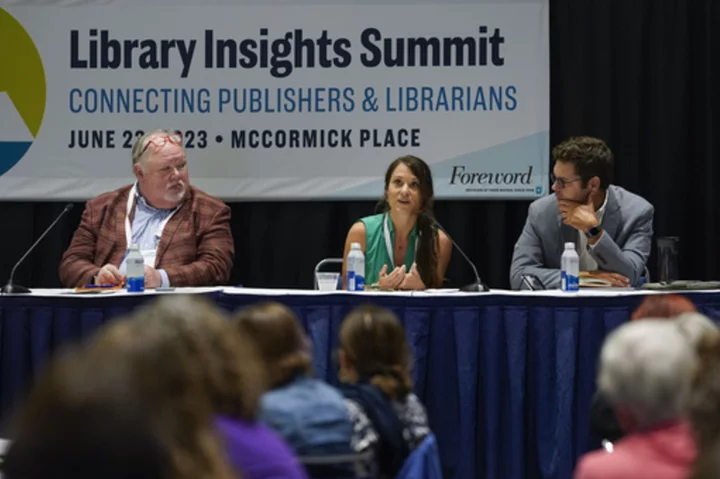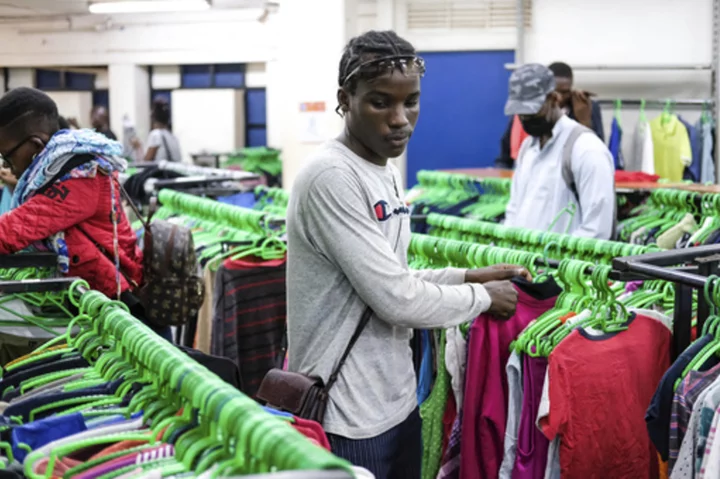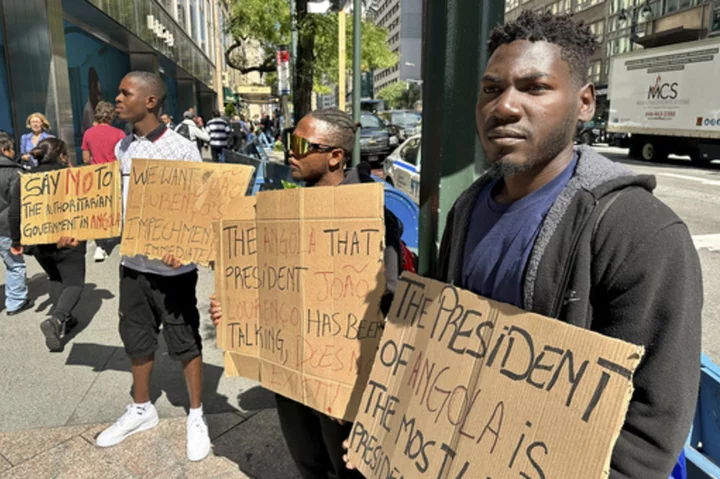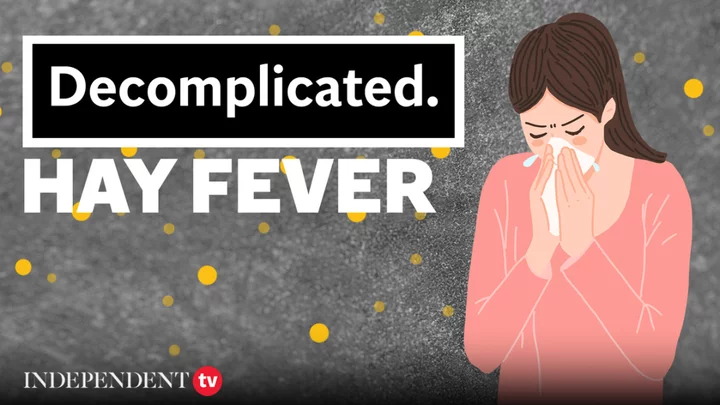CHICAGO (AP) — School librarian Jamie Gregory has been called a “pedophile” and “groomer,” bombarded with private messages threatening harm, accused of distributing pornography in schools, and had her personal address posted on social media.
She takes it on the chin.
“I’m just not going to quit. I’m not going to let them call me that, especially when I’ve worked my whole entire life to get to where I am,” said Gregory, who was named the 2022 South Carolina school librarian of the year.
The “shocking” allegations made her think: “My whole entire adult life, and all of my education and all my work — what if this is over? I’m not going to let that happen," Gregory said Saturday to a room packed full of about 100 fellow librarians at a training session on fighting book bans at the American Library Association’s annual meeting in Chicago.
The attendees broke into applause at Gregory’s declaration.
Book bans and how to fight them is a major focus of the this year's ALA's conference. “The world’s largest library event” provides training and education for library professionals, according to the conference website. Librarians may attend sessions, like the one Gregory spoke at, aimed at helping them confidently counter book challenges, fight legislative censorship and ensure the freedom to read.
The ALA conference hosts thousands of librarians, library staff, authors, publishers and educators as several states push to restrict access to books in schools and libraries — overwhelmingly those about race, ethnicity and LGBTQ+ topics. The association in March released data showing a record 1,269 demands to censor library books in the U.S. in 2022, a 20-year high.
“Addressing book censorship and protecting library users’ intellectual freedom, protecting librarians’ ability to provide for information in their communities, is at the forefront of this year’s meeting,” said Deborah Caldwell-Stone, director of ALA’s Office for Intellectual Freedom and executive director of the Freedom to Read Foundation.
All day Saturday, attendees are invited to climb atop a giant chair to read their favorite banned book.
Gregory selected “ Gender Queer,” Maia Kobabe's autobiographical comic on what it means to be to be nonbinary and asexual — the source of the firestorm against the school librarian and the most challenged book of 2022, according to the ALA. She also chose “Out of Darkness” by Ashley Hope Perez, a historical fiction novel about an interracial teen romance.
“This one always makes them crazy,” said Gregory, patting the copy of “Gender Queer" and ascending the stepladder to the massive velvet reading chair, books in hand.
Librarians “make information available to people freely and equitably,” and Gregory said she plans to keep doing that.
“I don’t impose my own personal moral system on students or patrons. They have to have their own, that’s not my job,” she said.
In Gregory's conservative community in Greenville, South Carolina, the public library board is pushing branches to remove Pride displays. In March, she testified against a bill that would allow parents to challenge any educational materials they say violate banned teachings around white privilege and implicit bias.
Still, Gregory said she feels the majority of her community supports her, despite the vocal minority.
“I’ve had a lot of people reach out to me who I don’t even know, saying, ‘We think you do a great job’ — even parents at the school,” she said.
Parents always have the right to choose what their children read, but they don’t have the right to restrict access for the whole community, said Christine Emeran, director of the Youth Free Expression Program of the National Coalition Against Censorship, a First Amendment advocacy organization.
“You can’t just concede to demands of a particular group of parents and to censor libraries,” she said.
Emeran, who is scheduled to be featured in a panel discussion called "Help! They’re coming for our books!” at the conference Sunday, began to notice an increase in book bans starting in 2021, at the beginning of President Joe Biden's term. She attributed the shift to “a cultural backlash” against changing views on LGBTQ+ issues, women's rights and the Black Lives Matter movement.
Local libraries are calling in the National Coalition Against Censorship for help now more than ever. In the past, the organization assisted on a few book ban cases per year. "Now we’re getting two or three a week," Emeran said.
“Librarians are under pressure and they’re feeling frustrated, discouraged,” said Emeran, who encouraged readers to support local libraries, attend school board meetings and get involved in their communities to protect the right to read.
Groups such as Moms for Liberty, No Left Turn in Education and Citizens Defending Freedom have had an outsized effect on what is allowed to be read, she said.
“The majority may oppose censorship as a whole. But the problem is that the majority are silent,” Emeran said.
Gregory and fellow panelists Lindsey Kimeri, coordinator of library services for Metro Nashville Public Schools, and Chris Chanyasulkit, an elected library trustee in Brookline, Massachusetts, advised attendees on how best to navigate book challenges in their communities.
Attentive faces bent over notebooks followed every word.
“No more humble brag, no being quiet, no more ‘be quiet at the libraries,’” Chanyasulkit said. “Not quiet anymore. Now we’re going to talk about how it's an incredible, game-changing place for communities, because you need to be loud. The others are, and we’re not doing enough.”
___
Savage is a corps member for the Associated Press/Report for America Statehouse News Initiative. Report for America is a nonprofit national service program that places journalists in local newsrooms to report on undercovered issues.









